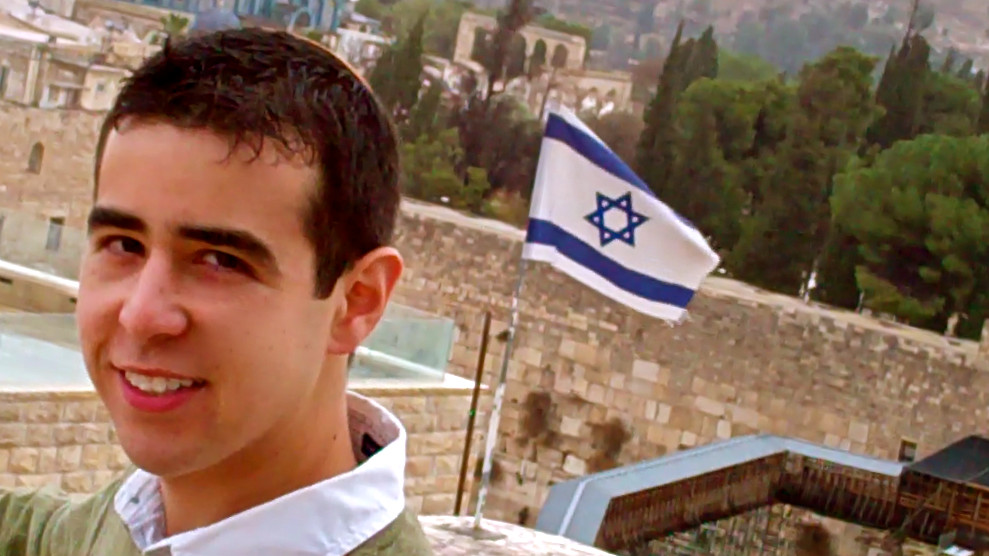From the heart of Jerusalem: Deep notes
Some alarm clocks play Mozart. Others tune into news radio. Mine is the elaborate procession of Sfardic men dressed in sudras and turbans pounding calloused hands on bongos as they parade today’s Bar-Mitzvah past my apartment. Instead of walking my dog around the neighborhood, I walk alongside the abundant black cats that lurk the streets. And I don’t go to the gym to run on the treadmill while watching MTV. I tread on two-thousand-year-old cobblestones through the walls my ancestors lived in before the Crusades. These are just a few of the perks of living in the Old City of Jerusalem.
Upon arrival in late August, I was eager to immerse myself in a year of study at Yeshivat Orayta. But I was uneasy about leaving behind one of my dearest passions—the cello. Turned out I didn’t have to. I rented a cello and managed to squeeze in an hour here and there.
During free time I started throwing a hat out on the street and playing cello for extra shawarma money. I’d see many beggars in beards and black hats drifting by, and I would feel a pit in my gut. These men, struggling to feed their families, desperately needed donations. But I was the one with a cello. There is something tourists seem to find intensely romantic about a kid in a t-shirt and tzitzis playing cello on cobblestone, and I was therefore the one attracting the majority of donations. I struggled with this injustice and determined I would not continue playing in the Old City under these circumstances.
Weeks later, the fire broke out in the North. In this fiercely tragic incident I saw my chance to use cello for something greater. I turned a cardboard box into a Magen David Adom sign and placed it beside me as I played in the square.
As my charity funds accumulated, beggars kept shuffling by, working to collect their fees. Embarrassed, I would stare intently at the ground, always waiting for them to pass. But aside from beggars, there were many tourists walking by. When I would see feet standing still in front of me, my playing would instantly be transformed from background noise to solo performance. With pleasure I would smile into their spellbound faces and let my strings sing.
After about two hours my arms were tiring and I decided that the next donation would mark my day’s conclusion. Ten minutes later I was relieved to see two feet standing at my cello’s end-pin. Here was my final donor, a satisfying end to my day’s work. With pride I looked into the face of my audience.
And a cold chill shivered down my spine, for looking me straight in the face stood a disheveled beggar. My eyes instinctively fell to the stone ground. He must want some of my Magen David Adom funds, I thought. He must think he’s more important than the Jews in the North, I imagined with disgust. I sunk my bow into the string, and my cello responded with bold, thick pitches that I hoped would drown out his stare.
But he wasn’t passing. And his pushka hung firmly in his hand. I finished the piece and without pause started another. Out of the corner of my eye I saw his eyebrows drawn tightly over his dark eyes as though he was pondering life’s difficult question. For five minutes this stubborn beggar would not pass.
Then I heard the faint rattle of coins and noticed the beggar digging his fingers through his pushka. I wondered what he was doing and what he wanted from me. For the first time I felt a tinge of shame that I had singularly ignored this listener. Discomfort swept through me as I realized I would have to look up.
Nervously I turned my face up towards him and looked him in the eyes. Suddenly my fingers slipped and my cello let out a yelp. I could hardly believe what I saw: unlike any beggar I had seen, this one wore a smile, broad and proud. I saw between his fingers the twinkle of a coin catching the sunlight. And as he muttered, “Yashar koach,” he stepped forward and dropped the coin into my box.
I live in the Old City of Jerusalem. Down to the beggars, who stand for far more than pity and poverty, this is no ordinary city. That day I met a man who, rather than losing himself in a dark world of overbearing hardship, managed to hold root in the greater people of Am Yisrael. Supporting needy Jews in the North became no different from supporting his hungry family at home. I have come to see that what makes the Old City so special to me is neither the architecture nor the history. Rather the people and their collective identity are the essence of the place I now call home.
Samuel Fisher grew up in Newton, Massachusetts and graduated from Maimonides School in 2010. He is spending the year studying in Yeshivat Orayta in the Old City of Jerusalem after which he will attend Harvard College.

 59.0°,
Mostly Cloudy
59.0°,
Mostly Cloudy 




